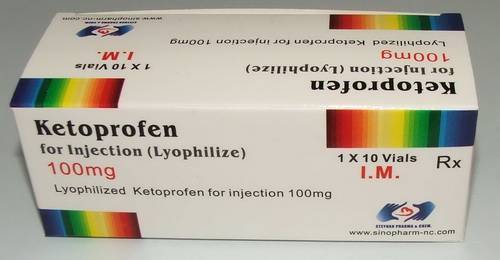
Ketoprofen works by blocking the effect of chemicals called cyclo-oxygenase (COX) enzymes; more about relieving pain with ketoprofen. More
Ketoprofen works by blocking the effect of chemicals called cyclo-oxygenase (COX) enzymes; more about relieving pain with ketoprofen.
Ketoprofen-nonsteroidal anti-inflammatory drug (NSAID)
Ketoprofen; 2-(3-Benzoylphenyl)propanoic acid; 2-(3-Benzoylphenyl)propionic acid; Ketoprofene
Fastum Gel, Ketofen, Ketonal-D, Ketopatch, Lupiflex, Maxigesic Plus, Myoril Plus, Ostofen, Redufen, Redufen-A, Relyonketo, Rhofenid, Rhofenid Gel, Vofane
2-(3-benzoylphenyl)propanoic acid
Ketoprofen is a nonsteroidal anti-inflammatory agent (NSAIA) with analgesic and antipyretic properties.
25 to 300 mg per day in divided doses.
Analgesic and antipyretic effects. Ketoprofen is used to treat osteoarthritis, rheumatoid arthritis, dysmenorrhea, and alleviate moderate pain.
Acute interstitial nephritis, reversible decline in renal function; GI symptoms e.g. discomfort, nausea, diarrhoea; pain and tissue damage at injection site (IM). Potentially Fatal: Rarely, idiosyncrasy, anaphylaxis; very rarely GI haemorrhage.
15-30 ?
254.2806
C16H14O3
22071-15-4